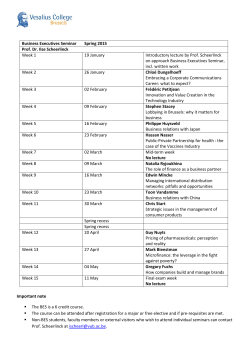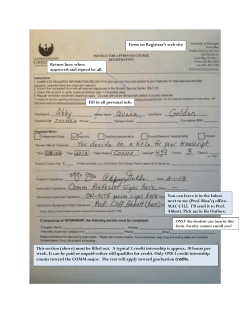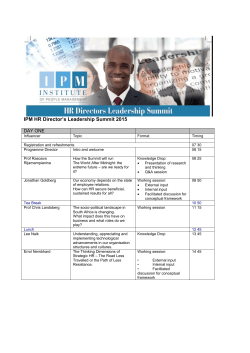
The 2015 Information Package
INFORMATION PACKAGE INTERNATIONAL CRIMINAL COURT THE HAGUE MOOT COURT COMPETITION MAY 2015 Grotius Centre for International Legal Studies, Leiden University Organization Committee Prof. Carsten Stahn Prof. Michael P. Scharf Ms. Lieneke Louman LL.M. Board of Advisors includes: Morris Anyah, Prof. Cherif M. Bassiouni, Prof. Matthew E. Brotmann, Mark Ellis, Donald M. Ferencz, Prof. Paola Gaeta, Justice Richard J. Goldstone, Prof. Larissa van den Herik, Karim A.A. Khan QC, Justice Philippe Kirsch, Prof. Tim McCormack, Prof. Hope Elizabeth May, Simon Minks, William Pace, Prof. William A. Schabas, Prof. Michael P. Scharf and Ambassador Christian Wenaweser The Hague, September 2014 Grotius Centre for International Legal Studies P.O. Box 13228 2501 EE The Hague The Netherlands T: +31.(0)70 800 9575 F: +31.(0)71 527 8223 E: grotiuscentre@cdh.leidenuniv.nl www.iccmoot.com @ICCmoot /groups/1501660426738278/ International Criminal Court Moot Court Competition 2015 2 TABLE OF CONTENTS The Competition ................................................................................................. 4 Purpose ................................................................................................................. 6 Value ...................................................................................................................... 7 Structure ................................................................................................................ 8 Partners ................................................................................................................. 9 Contact .................................................................................................................. 10 International Criminal Court Moot Court Competition 2015 3 THE COMPETITION The Grotius Centre for International Legal Studies proudly presents the International Criminal Court Moot Court Competition, set to take place in May 2015 in The Hague, the Netherlands. The ICC Moot Court Competition welcomes universities from all over the world for a large scale moot court simulating the proceedings of the International Criminal Court (ICC). The Competition consists of an extensive six-day educational and social program, which brings together students of diverse backgrounds and cultures to The Hague to challenge their skills as future international lawyers. The final round is expected to take place in an actual ICC courtroom with ICC judges adjudicating. The establishment of the world’s first International Criminal Court provided a fantastic opportunity to further support the rule of international law and the fight against impunity by garnering a youth-led interest. The Competition involves collaboration with judges from international courts and tribunals, professors of international (criminal) law, and other legal professionals. This network makes the ICC Moot Court Competition a realistic simulation of ICC proceedings. The Competition’s case addresses fundamental issues of substantive and procedural international criminal law. We expect to welcome 60 teams (300 students) from universities from all over the world to participate in this edition of the ICC Moot Court Competition). International Criminal Court Moot Court Competition 2015 4 Finals of the Competition are adjudicated by 5 ICC Judges/staff ©ICC-CPI PURPOSE The purpose of the ICC Moot Court Competition is threefold: 1. To allow the top law students from all over the world to improve their knowledge of international criminal law in practice and in particular of the ICC and its proceedings. 2. To provide students with the opportunity to become familiar with world-famous institutions in The Hague such as the ICC, the International Criminal Tribunal for the former Yugoslavia (ICTY), the Special Tribunal for Lebanon (STL), the International Court of Justice (ICJ) and the Peace Palace Library. 3. To enhance knowledge about the Rome Statute, especially within countries that have yet to ratify it, by providing the top legal minds of the future from both Member and nonMember States alike, an opportunity to learn more about the ICC. Their knowledge and enthusiasm for international criminal law will be further stimulated by the interaction they will have with legal experts and professionals they will meet during the Main Rounds in The Hague. International Criminal Court Moot Court Competition 2015 6 VALUE The organization is dedicated to providing an innovative and unparalleled educational experience for all those involved in the Competition, with learning opportunities both within and outside the fictional Courtroom. Site Visits On top of the rigorous competition schedule, students get to experience first-hand the most important institutions in international law and governance operating in The Hague. Meeting Professionals and Experts in the Field Students are able to meet distinguished international jurists and practitioners who judge all rounds and give extremely helpful guidance and feedback. A Meaningful International Experience The Competition also serves as a perfect forum for global interaction. Law students from all sides of the globe are united by a common interest in international criminal law allowing them to learn from each other, while forging strong international bonds which facilitate their future career successes and create new friendships. This aspect makes the ICC Moot Court Competition a truly unforgettable experience. University Credit The high learning value and workload make this program eligible for course credit at the participating universities. © ICC-CPI International Criminal Court Moot Court Competition 2015 7 STRUCTURE Main Round Each participating team is given the chance to argue all sides of the case by assuming each of the roles of the court: Prosecutor, Defense Counsel and Government Counsel, or the Legal Representative for the Victims. The last two roles rotate every other year. The overall score of the teams of the Main Round will be a combination of the written memorial and oral session scores. All memorials will be evaluated by two different evaluators, prior to the start of the Main Round. The Oral sessions will be attended by three (with a minimum of two) Panel Members. Semi Final The Semi-Final Round will accommodate nine teams (three sessions, three teams each) advancing from the main round. Based on their scores for their oral presentations in the SemiFinals, the winner of every session will proceed to the finals Finals The Finals are expected to take place in an ICC courtroom and will be adjudicated by ICC judges/staff, comprising the most unique aspect of the Competition. Security, court room staff and photographers are also present, and a live stream is broadcasted on the ICC website. Preliminary (National/Regional) Rounds A maximum of two teams per country are allowed to enter the international rounds. (An exception is made if six or more teams from the same country register. In this case, three universities may represent their country). If there are more than two registrations per country, teams must submit and address a ‘preliminary question’ in writing or participate in a specially organized national round. Please read the Rules of Procedure 2015 for the exact details. International Criminal Court Moot Court Competition 2015 8 PARTNERS The International Criminal Court (ICC) The organization and the ICC work closely together to deliver a very informative and realistic simulation for all participants. For more information, visit www.icc-cpi.int Leiden University The Grotius Centre for International Legal Studies - Leiden University is the host of the Competition. The Oral Rounds will take place in the Centre 4 Innovation, Leiden University Campus The Hague. For more information visit: www.grotiuscentre.org www.leiden.edu, www.centre4innovation.org, Pace University Pace University (United States of America) organizes the preliminary rounds for the Americas. Teams from universities through out North America, the Caribbean and South America are obliged to take part in the Pace preliminary rounds. The beginnings of the ICC Moot Court Competition were founded at Pace University by Professor Matthew E. Brotmann. For more information visit: www.pace.edu China University of Political Science and Law China University of Political Science and Law is the organizer of the Chinese Regional Rounds. For more information visit: www.lawschoolchina.com Moscow State Law Academy Moscow State Law Academy is the organizer of the Russian Regional Rounds. For more information visit: www..msu.ru/ International Criminal Court Moot Court Competition 2015 9 CONTACT Grotius Centre for International Legal Studies - Leiden University Organization Committee Prof. Carsten Stahn, Grotius Centre for International Legal Studies, Leiden University, Chair ICC Moot Court Organizational Committee Prof. Michael P. Scharf, Case Western Reserve University, Chair Board of Advisors Ms. Lieneke Louman LL.M., Project Manager, Grotius Centre for International Legal Studies, Leiden University, Chair ICC Moot Court Organizational Committee Board of Advisors includes Morris Anyah, Prof. Cherif M. Bassiouni, Prof. Matthew E. Brotmann, Mark Ellis, Donald M. Ferencz, Prof. Paola Gaeta, Justice Richard J. Goldstone, Prof. Larissa van den Herik, Karim A.A. Khan QC, Justice Philippe Kirsch, Prof. Tim McCormack, Prof. Hope Elizabeth May, Simon Minks, William Pace, Prof. William A. Schabas, Prof. Michael P. Scharf and Ambassador Christian Wenaweser Grotius Centre for International Legal Studies P.O. Box 13228 2501 EE The Hague The Netherlands T: +31.(0)70 800 9575 F: +31.(0)71 527 8223 E: grotiuscentre@cdh.leidenuniv.nl www.iccmoot.com International Criminal Court Moot Court Competition 2015 10
© Copyright 2025










